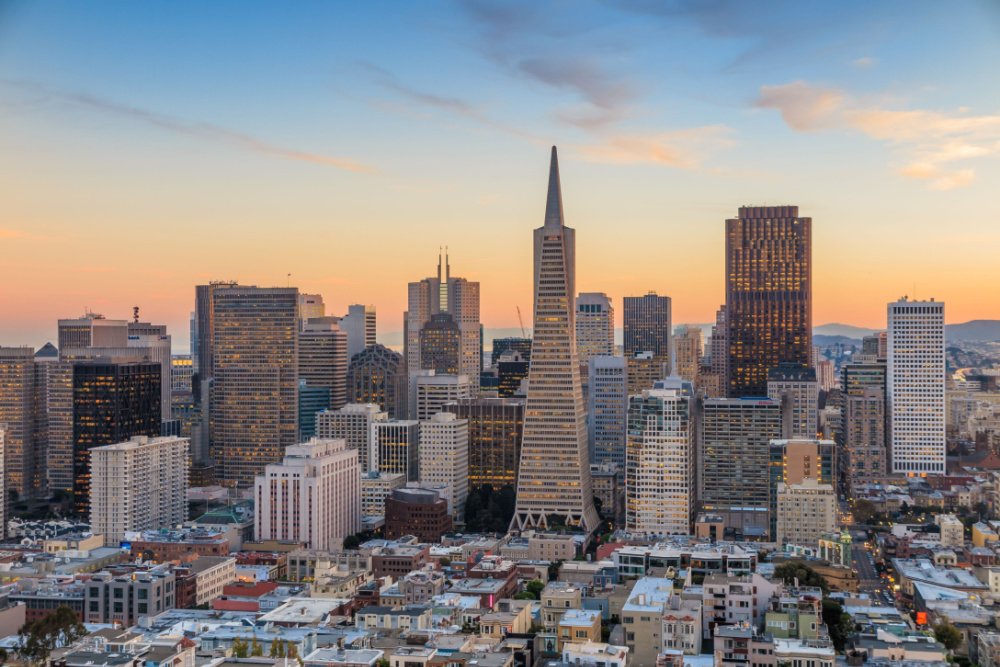And the Winners Are… Here Are the 14 Innovators Chosen to “Reimagine” San Francisco
/f11photo/shutterstock
Winners of the Yes San Francisco (Yes SF), Urban Sustainability Challenge include companies with names like Posh Electric, Flower Turbines, BluumBio and Zauben. They have cutting-edge ideas, too. RainStick, for example, has created a circular shower system that uses 80% less water and energy. Urban Machine employs AI and robotics to reclaim construction wood waste. Babylon Micro-Farms is an indoor farming service that allows communities and businesses to grow food indoors year round. And Itselectric makes charging electric vehicles affordable and accessible for city drivers who don’t have garages or driveways. (See the complete list of Yes SF winners here.)
The 14 entrepreneurs were selected in the final round of the Yes SF challenge, a collaboration between Deloitte, the World Economic Forum, Salesforce, Citi, the San Francisco Chamber of Commerce and more than 20 other organizations.
As IP reported in September when 26 semifinalists were announced, the Yes SF challenge is the first place-based initiative launched by UpLink, an open innovation platform created by Deloitte, Salesforce and the World Economic Forum to highlight social entrepreneurs and connect them with sources of funding and expert support. UpLink has helped channel $1.6 billion to startups and social enterprises since it was created two years ago (see other UpLink challenges).
After the challenge was announced last spring, close to 150 innovators offered submissions. The applicants went through several rounds of evaluations by expert reviewers. The 14 winners will now go through an onboarding process with UpLink, which will provide access to additional funding and expert support. The SF Chamber of Commerce will offer local support and introductions to relevant stakeholders. In December, Citi, another partner, will hold an investor engagement day so innovators can make their pitches for additional funding from impact and venture capitalists.
When the Yes SF winners were chosen, Deloitte announced a $1 million grant to the winning innovators. “Deloitte has been supporting the coalition and the Yes SF effort through our skills and capabilities and funding,” said Kerri Folmer, managing director of Deloitte’s Monitor Institute. “The $1 million is a grant distributed among the innovators to help them deploy their solutions and products in San Francisco.”
Jeff Merritt, who heads the Centre for Urban Transformation at the World Economic Forum called Yes SF “a shared commitment from public and private sector leaders to reimagine the possibilities of urban living and revitalize San Francisco's downtown economy for a more sustainable and resilient future.”
Blueprint for sustainable cities
Merritt pinpointed one of the primary goals of Yes SF: to revitalize San Francisco’s blighted downtown, which is struggling to bounce back after COVID, multiple office and business closures, and waves of tech layoffs.
As part of the selection criteria, applicants were required to have a physical presence in San Francisco or to be willing to establish at least part of their operations in the city in the future. They were also required to show a local benefit to San Francisco “and a clear path to deployment in the city, such as alignment to the San Francisco Climate Action Plan or the Roadmap to Downtown San Francisco’s Future.”
The hope is that the new businesses will grow innovative green technologies while helping stimulate the economy and providing training and job opportunities.
“It’s exciting to see these entrepreneurs and their solutions, because the solutions themselves will bring change in San Francisco from a sustainability standpoint,” Folmer said. “And you can see how that affects equity and creates a whole new category of jobs. If all 14 of these businesses flourish — or even some subset of them flourish — San Francisco will become known as a place for sustainable business, which will in turn draw other entrepreneurs. It could create a sort of hive effect of change.”
Last year, Deloitte announced a 10-year, $1.5 billion impact investment “to foster a more equitable society”; Yes SF is part of that larger plan. “We are looking at new ways to drive change that hopefully will redefine not only corporate philanthropy, but philanthropy in general,” Folmer said in September. “Deloitte is in a place to bring together unique coalitions and collaborators to not only hold the space, but to give them the platform and funding to create something together.”
The Yes SF partners are hoping that the challenge will offer a model that can be recreated in other cities around the globe. Folmer said it is too early to identify where the partners will focus their efforts next, but a number of cities have expressed interest.
“We’re now discussing — once we see progress in San Francisco — how to document what we've done here to create a blueprint, and how it could be applied in other geographies and cities,” she said. “I can imagine in different communities this could take very different shapes. It will be interesting to learn, what does innovation look like in other communities? And how do you use innovation to solve community problems?”









